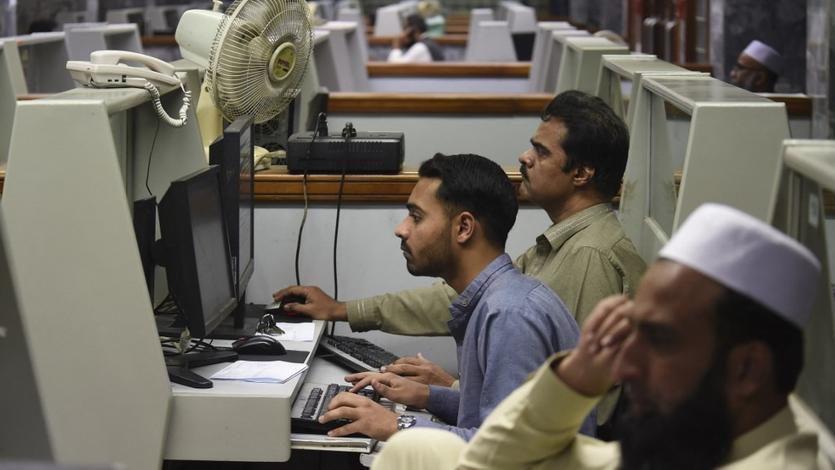 Stockbrokers look at the latest share prices at the Pakistan Stock Exchange (PSE) in Karachi on Feb 3, 2023. (PHOTO / AFP)
Stockbrokers look at the latest share prices at the Pakistan Stock Exchange (PSE) in Karachi on Feb 3, 2023. (PHOTO / AFP)
ISLAMABAD — Pakistan and the visiting International Monetary Fund mission are struggling to arrive at a consensus on fiscal adjustment plans, sources said on Monday, in talks aimed at unlocking critical funds needed for the ailing South Asian economy.
The mission has been in Islamabad since Jan 31 to sort out the differences over fiscal policy that has stalled the release of more than $1 billion from $6.5 billion bailout package signed in 2019.
The IMF says the primary deficit is 0.9 percent of GDP, or around 840 billion Pakistani rupees ($3.06 billion), but according to Islamabad it stands at 0.45 percent, or around 450 billion rupees ($1.64 billion), said the officials, who declined to be named as the talks were confidential
The IMF funding is crucial for the $350-billion economy facing a balance-of-payments crisis with foreign exchange reserves dipping to less than three weeks of import cover.
READ MORE: IMF giving Pakistan tough time over unlocking funds, PM says
The two sides disagree on their data on the fiscal gap, two finance ministry officials with knowledge of the talks told Reuters.
The IMF says the primary deficit is 0.9 percent of GDP, or around 840 billion Pakistani rupees ($3.06 billion), but according to Islamabad it stands at 0.45 percent, or around 450 billion rupees ($1.64 billion), said the officials, who declined to be named as the talks were confidential.
"There is a clear difference in data," said one of them.
They said Islamabad is expecting a deal by Feb 9.
Observers say the funds are needed to avoid defaulting on external payment obligations, while the lender's green signal is vital for any other external funding.
The finance ministry and the IMF country representative did not respond to Reuters request for comments.
Stumbling block
Pakistan's 2022-23 budget in June estimated the primacy deficit to be 0.2 percent of GDP and fiscal deficit 4.9 percent of GDP.
The country has already shifted back to a market-based exchange rate and hiked fuel prices - measures demanded by IMF. But analysts say the steps will increase crippling inflation, which is already up 27.5 percent year-on-year in January.
The big pile of energy sector debt - over 4 trillion Pakistani rupees ($14.55 billion), including 1.6 trillion in the gas sector- is another stumbling block in the talks, officials said.
READ MORE: Pakistan reaffirms commitment to IMF program after meeting
They said Pakistan has submitted a plan to cut the debt in phases though price hikes and dividends from gas companies, but the IMF is demanding a clearer path forward.
Over 900 billion rupees in gas sector subsidies for FY2022-23 are also on the chopping block, they said, adding that Pakistan has agreed to withdraw export sector subsidies.
If issues are resolved, Pakistan will introduce a finance bill in parliament to generate revenue, like a one-off flood levy on luxury imports, windfall levy on banks and duties on cigarettes and carbonated drinks, as well as to cut expenditures and development funds.


